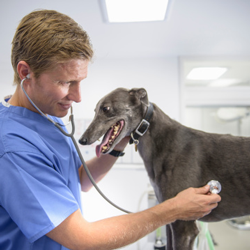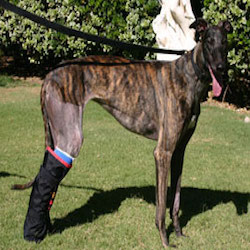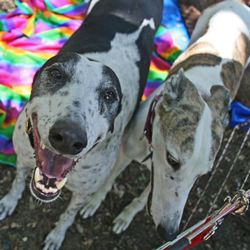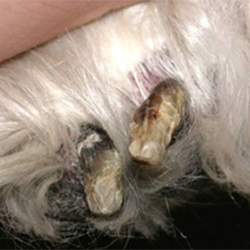HEALTH-GREYHOUNDS ARE DIFFERENT
Greyhounds have some physical oddities, quirks or just plain differences that can get them and the people who love them in trouble! This section of our website has a listing of many of them. It includes either a short write-up on the various topics and/or links where you can get third party information on greyhound specific topics.
At this point, this list is a work in process but we believe a good starting point for every adopter to be aware of. First, as a word of caution, if you are interviewing a new veterinarian and you are not aware that they have a significant number of greyhounds in their practice, you should always ask them about their greyhound experience. In most cases, the answer will be that they are experienced with greyhounds. The next step is to dig a bit deeper and ask them what makes greyhounds different from other dogs. In our experience, they will often say that greys have a couple of range differences in their blood chemistry or that they typically have low thyroid levels. The first answer is reasonable in its short form but the second is not so good. You will soon realize that these answers are way too limited to cover the range differences your greyhound possesses. You must remember that greyhounds do not make up a large part of the pet population in the US, so in many cases veterinarians have seen very few of them. It is always in your greyhound’s best interest for you to learn as much as you can about what makes your greyhound different so you can be their advocate. I know this advice may not make people popular with some veterinarians but you are the adopter, their guardian, and your greyhound’s health and welfare is in your hands.
At this point, this list is a work in process but we believe a good starting point for every adopter to be aware of. First, as a word of caution, if you are interviewing a new veterinarian and you are not aware that they have a significant number of greyhounds in their practice, you should always ask them about their greyhound experience. In most cases, the answer will be that they are experienced with greyhounds. The next step is to dig a bit deeper and ask them what makes greyhounds different from other dogs. In our experience, they will often say that greys have a couple of range differences in their blood chemistry or that they typically have low thyroid levels. The first answer is reasonable in its short form but the second is not so good. You will soon realize that these answers are way too limited to cover the range differences your greyhound possesses. You must remember that greyhounds do not make up a large part of the pet population in the US, so in many cases veterinarians have seen very few of them. It is always in your greyhound’s best interest for you to learn as much as you can about what makes your greyhound different so you can be their advocate. I know this advice may not make people popular with some veterinarians but you are the adopter, their guardian, and your greyhound’s health and welfare is in your hands.












